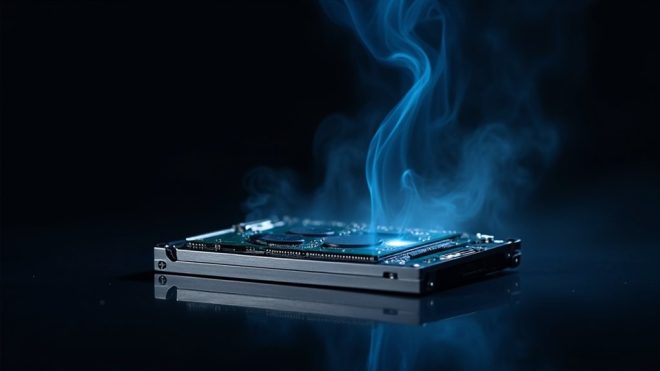Recent Windows 11 users are experiencing mysterious SSD failures, particularly during large file transfers exceeding 50GB. The issues, initially linked to update KB5063878, primarily affect drives with Phison NAND controllers, causing devices to vanish and requiring system reboots. Although Microsoft denies direct correlation, evidence suggests otherwise. Users report corrupted files and battery drain problems, with drives lacking onboard DRAM cache being most vulnerable. Understanding the full scope of this technical puzzle requires examining deeper system interactions.

When mysterious SSD failures began surfacing across Windows 11 systems in August 2025, users initially blamed a seemingly innocuous update – KB5063878. Reports flooded tech forums of solid-state drives mysteriously vanishing from systems after large file transfers, particularly affecting drives using Phison NAND controllers and operating at around 60% capacity.
Windows 11’s latest update sparked widespread SSD failures, with drives vanishing during large file transfers, especially affecting Phison NAND controllers.
The pattern emerged first in Japan before spreading globally: SSDs would abruptly disappear during hefty data writes exceeding 50GB, leaving users staring at corrupted files and undetectable drives. Like a digital version of a vanishing act, these storage devices would simply cease to exist in Windows 11’s eyes, often requiring a system reboot to reappear – if they returned at all.
Microsoft’s response has been significantly measured, if not sceptical. After a week-long investigation, the tech giant denied any direct correlation between KB5063878 and the reported SSD failures. Yet the mounting evidence suggests something more than coincidence, especially given Windows’ history with update-induced storage hiccups.
The plot thickens when examining the hardware angle. Although Phison controllers initially took the spotlight, the issue appears agnostic to specific brands or controllers. More telling is the correlation with drives lacking onboard DRAM cache and those operating under sustained write loads. The update included fixes for 119 security vulnerabilities, making the root cause even harder to pinpoint. Users reported battery drain issues alongside frequent system restarts and SSD detection problems.
It’s as if Windows 11 and certain SSD configurations have developed an allergic reaction to each other under specific conditions.
What makes this particularly perplexing is the sporadic nature of the failures. Neither Microsoft nor Phison could replicate these issues in controlled testing environments, regardless of user reports painting a clear picture of the problem’s reality. It’s like trying to photograph a ghost – the evidence exists, but capturing it proves frustratingly elusive.
The silver lining? Most affected drives recover after a reboot, suggesting this isn’t a permanent death sentence for your precious storage.
Nevertheless, the intermittent nature of these failures poses a more insidious threat: the potential for data corruption during critical operations. Think of it as Russian roulette with your data – you might get lucky most times, but when it hits, it hits hard.
As Microsoft continues its investigation alongside SSD manufacturers, users are left wondering whether their next large file transfer might trigger the dreaded drive disappearance.
Although the company maintains its stance that KB5063878 isn’t the culprit, the tech community remains sceptical. Until a definitive cause is identified and addressed, the sage advice remains: keep your backups current and maybe think twice before pushing your SSD to its limits on Windows 11.
Final Thoughts
Current evidence indicates that while Windows 11’s SSD behavior may require attention, it’s not yet conclusive that the OS is directly causing drive failures. Users are advised to perform regular backups, keep firmware updated, and remain vigilant for any irregular drive activity. Microsoft is actively investigating these concerns, but adhering to basic maintenance practices is the most effective way to protect against data loss, regardless of your operating system.
If you need assistance with backup solutions or firmware updates, Ipswich Computer Repairs is here to help. Don’t wait until it’s too late—click on our contact us page to get in touch with our expert team today!

